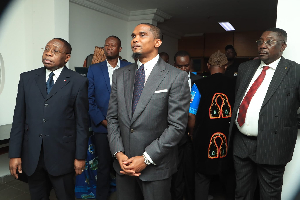Divination is almost a fashion nowadays and it has become the modern prayer. People wake up, tune on their radios; and as they take their breakfast, they all listen or read what the horoscope predicts for the day. And accordingly, they spend the day, in sadness or in joy, without knowing the vision that has been brutally forced on them.
For many others; the fact that they are Catholic, Christians or Moslem does not matter, when faced with difficulties and challenges like succeeding in exams, winning in competitions, securing husbands, having children, flourishing in business, and overcoming enemies, they ltend to be professionals in seeking answers far from God or Mohamed. They run to charlatans, soothsayer, fortune and oracle tellers and astrologers.
This practice is getting worse today with the advent of the Internet and mobile phones. Through these modern means of communications, users have the possibility of consulting online astrology pages. Faced with this growing trend, what is the Church’s stand? What does the Church say about astrology? Why is the Church against Catholics relying on and using the horoscope? To better understand the Church’s position on the subject, it is important to understand what divination means and thereafter explore what the Scriptures and the Church Fathers say.
What is divination? The Oxford Dictionary defines divination as the practice of seeking knowledge of the future or the unknown by supernatural means. It comes from the Latin word divinare, meaning “to predict”, “to foresee” or “to be inspired by a god.”
Divination has often been used in the past to scrutinise the future and to foretell what is to happen. It was done by playing or throwing cards, reading palms, or exploring astral signs. The Holy Scriptures condemns the practice of divination and other related practices like horoscope. Deuteronomy 18:10 says, “There shall not be found among you . . . anyone who practices divination or tells fortunes or interprets omens.” I Samuel 15:10 compares rebellion to the “sin of divination.” In 2 Kings 17:16-17, practicing divination is listed as one of the reasons for Israel’s exile. In Jeremiah 14:14 it is said, “They are prophesying to you a lying vision, worthless divination, and the deceit of their own minds.”
So, when compared to God’s truth, divination is false, deceitful, and worthless (Deut. 4:19, 17:3; Jer19:12–13; 2Kings 21:3–5, 2 Kings 23:4 Zeph. 1:4–6; Jer. 8:2; Acts16: 16-19) Following the Scriptures, the Fathers of the Church are opposed to the practices of divination and horoscope.
Tertullian "We observe among the arts also some professions liable to the charge of idolatry. Of astrologers, there should be no speaking even; but since one these days has challenged us, defending on his own behalf perseverance in that profession, I will use a few words. I allege not that he honours idols, whose names he has inscribed on the heaven, to whom he has attributed all God’s power. . . . One proposition I lay down: that those angels, the deserters of God [demons] . . . were likewise the discoverers of this curious art [astrology], on that account also condemned by God" (Idolatry 9 [A.D. 211]).
Synod of Laodicea "They who are of the priesthood or of the clergy shall not be magicians, enchanters, [planetary] ‘mathematicians,’ or astrologers" (Canon 36 [A.D. 362]).
Athanasius "They [astrologers] have fabricated books which they call books of [astrological] tables, in which they show stars, to which they have given the names of saints. And therein of a truth they have inflicted on themselves a double reproach, those who have written such books, because they have perfected themselves in a lying and contemptible science [astrology], and as to the ignorant and simple, they have led them astray by evil thoughts concerning the right faith established in truth and upright in the presence of God" (Easter Letter 39:1 [A.D. 367]).
Augustine "To whom then must we make an answer first—to the heretics or to the astrologers? For both come from the serpent, and desire to corrupt the Church’s virginity of heart, which she holds in undefiled faith" (Homilies on John 8:10 [A.D. 416]).
The Catechism of the Catholic Church discusses this issue extensively in part three (Life in Christ) Section Two (The Ten Commandments) Chapter One (You shall love your God with all your heart, and with all your soul, and with all your mind). In no. 2116 and 2117, it condemns all forms of divination and all practices of magic or sorcery.
No. 2116: “All forms of divination are to be rejected: recourse to Satan or demons, conjuring up the dead or other practices falsely supposed to "unveil" the future. Consulting horoscopes, astrology, palm reading, interpretation of omens and lots, the phenomena of clairvoyance, and recourse to mediums all conceal a desire for power over time, history, and, in the last analysis, other human beings, as well as a wish to conciliate hidden powers. They contradict the honour, respect, and loving fear that we owe to God alone.”
No. 2117: “ All practices of magic or sorcery, by which one attempts to tame occult powers, so as to place them at one's service and have a supernatural power over others - even if this were for the sake of restoring their health - are gravely contrary to the virtue of religion.
These practices are even more to be condemned when accompanied by the intention of harming someone, or when they have recourse to the intervention of demons. Wearing charms is also reprehensible.
Spiritism often implies divination or magical practices; the Church for her part warns the faithful against it. Recourse to so-called traditional cures does not justify either the invocation of evil powers or the exploitation of another's credulity.”
In short, the Catholic Church condemns divination and the horoscope because it is false, deceitful, and worthless. It can bring great harm to those who abide by it. I remember reading an article on bibliomancy where the following story was told of somebody who went to the Bible to know what the future has for him. “So he closed his eyes, opened the Bible randomly, and stuck his finger on the page.
He opened his eyes and read Matthew 27:5, “Judas . . . went away and hanged himself.” Not liking that answer, the man tried again. This time, his finger landed on Luke 10:37, “Go and do likewise.” Again, not liking that answer, the man tried again. This time his finger landed on John 13:27, “What you are about to do, do quickly.” (See in http://www.gotquestions.org/Bible-divination.html)
Our faith in God is not based on mere and irrational beliefs. We are invited to develop a faith that is informed by reason. At times, providently, we may fall on one or the other verse that will fit very well with the situation we are experiencing. However, this does not spare us from the fact that God’s word is first and foremost to be studied, meditated and lived. As somebody puts it, “We are to study God’s Word intently, not randomly.”
Nobody apart from God knows the future. To presume the contrary is to see oneself as a god and in so doing become an idolater of oneself.
Opinions of Tuesday, 28 October 2014
Auteur: l'effortcamerounais.com














